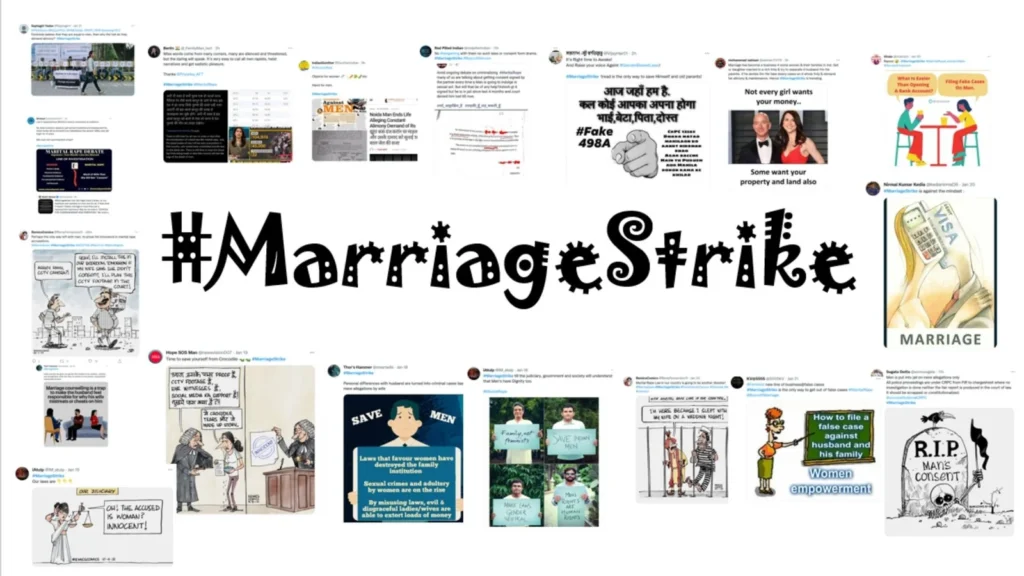The year began for many Indians with the trending hashtag #MarriageStrike, which first became popular on Twitter (Chabba 2022) in response to the Delhi High Court’s discussion regarding marital rape in India. Over the past few weeks, the Court has listened to proponents for and against criminalising marital rape. The hashtag became a tool for many Indians to lobby against the criminalisation of marital rape. The debate did not ignite a ‘men versus women’ conflict, but it instead evoked a conversation on gender violence, gender bias of laws, and consent.
On the other side, many advocates for the criminalisation of marital rape, like Ms Kavita Krishnan (@kavita_krishnan), mock the hashtag, but use it to respond to the proponents against criminalising marital rape.
I strongly hope that men who are going on #MaritalStrike remain on strike for ever. They are not safe for any woman to be married to. Anyone who thinks consent has no place in a marriage, should never marry.
— Kavita Krishnan (@kavita_krishnan) January 20, 2022
This article adopts a contextual approach to the debate. While laws should not be merely transported to another country, cultural norms should not be used as an excuse to justify not taking adequate steps to protect women. Criminalising marital rape is necessary to protect women against violence. Moreover, in line with India’s commitment to gender equality and its ratification of the Convention on the Elimination of All Forms of Discrimination Against Women (CEDAW) in 1993, the country must take all the steps necessary to eliminate violence against women.
CURRENT INDIAN LAWS REGARDING RAPE
India’s outdated laws regarding rape came into question during the infamous 2012 Nirbhaya rape case in New Delhi (Kim 2018). The horrific gang-rape put pressure on the government to review the existing laws on sexual violence. The Justice Verma Commission (2013) recommended that the government remove the exception of marital rape from the Constitution, but the Indian government rejected it (Kim 2018). The government’s commitment to protecting women from ongoing sexual violence is hindered because men cannot be prosecuted for raping their spouses. India is among the thirty-four countries where marital rape is neither criminalised nor can spouses file a complaint against their partner for non-consensual sex (UN Women 2019). The Indian Penal Code (IPC) defines rape in Section 375. However, there is an exception to what can be classified as rape. The second exception to Section 375 of the IPC dictates that “sexual intercourse by a man with his own wife … is not rape” (Sharma 2016, 159). By doing so, the various Indian courts refuse to acknowledge that husbands abuse their wives by raping them.
“MEN ARE VICTIMS”
Proponents against criminalising marital rape predicate their argument on the claim that men are the ‘real victims’ of a gender bias, as women are the only ones protected by law. Men’s rights groups argue that laws within the Domestic Violence Act (2005) are often misused and target innocent men (Masih 2022). During the hearing, Advocate Sai Deepak (Sachdev 2022) argued that a new offence would be created if it were proven that the exception was unconstitutional. Advocate Sai’s argument for the exception resonates with many men as they claim that women will use the law to “extort money from their families or blackmail them” (Masih 2022). Numerous groups reiterate this sentiment, like Save Indian Family Foundation (creators of the hashtag), which argue that by criminalising marital rape, men will be falsely accused of rape and will not receive any protection (Farrukh 2022). This sentiment is prevalent by analysing numerous Twitter comments and posts that use the hashtag. Many men who have been airing their grievances on Twitter believe that they are victims, and that the judiciary only aims to protect women.
While the users often criticise the existing laws by arguing that men are under threat, these users are unaware of the reality. They often criticise that there is no legal recourse for the fake complaints filed by women; however, this over-generalisation makes every man a victim. Despite the laws against Domestic Violence (like physical or mental cruelty and dowry related harassment), thousands of women are still killed every year in India just because of dowry disputes (Masih 2022). Moreover, many women are still told to face the abuse they experience to protect the family (Masih 2017). Women’s subjugation to her husband and his family is an ongoing struggle that has hampered reporting any abuse they may face. In 2020 more than 111,000 cases of Domestic Violence were reported (Maish 2022), yet many women are still waiting for justice.
“CONSENT”
The second argument used by men’s rights groups is intrinsically based on consent. Members of another organisation called the Purush Aayog argue that “consent and willingness” (Farrukh 2022) to participate in sexual acts are ingrained in the fundamentals of marriage. Therefore, legally interfering with that pushes men to boycott marriages.
The Indian Judiciary allows the married women to have sex with her boyfriend and deny sex to her husband. If the husband insist to exercise his conjugal rights he gets tagged as a Rapist. Hence #MarriageStrike Nationwide https://t.co/3Do2u7a05c
— Ashraf Ansari (@ashrafnansari) January 23, 2022
Whilst numerous organisations use this narrative to argue that their stance is to protect ‘Indian culture’ and the ‘Indian family institution,’ their idea is predicated on a rule imposed in India during colonial times. Sir Mathew Hale’s argument (Singh 2021) that defended marital rape became influential and integral for England and its colonies that were forced to accept the rules imposed by the Empire. The essence of his argument is that by marrying a man, a woman gives him “matrimonial consent” (Kim 2018), which she cannot withdraw. As the history of the immunity shows that it is originated from archaic English customs and laws that need to be changed, many Indian ‘Meninist’ organisations still base their arguments grounded on these ideas imposed during colonialism.
However, through this discussion, another facet of the argument reveals the lack of understanding surrounding consent. Society often views women as objects. In numerous patriarchal societies like India that privileges men with more freedom than women, it is hard for many to comprehend that women have the agency to refuse sexual intercourse with their husbands. In this hierarchy of power, normative gender roles assign the wife as the “receiver” while the husband is the “presenter of sex” (Mukhtar, Mukhtar, and Rana 2022).
While the anti-rape laws explicitly emphasise consent, allowing the exception emphasises that women’s consent within a marriage is void as they must fulfil their husbands’ wishes and demands. According to Singh (2021), owing to societal views and traditions, husbands often believe that they control their wives and own them (4). Viewing them as property ensures that a husband can force sexual intercourse as a woman must “serve him.” Consent is a subject that not many Twitter users understand. As emphasised above, women’s consent should not be attached to her relationship with the man. Consent is a fundamental human right that every person has access to. Taking away a married women’s fundamental rights dehumanises them.
CONCLUSION
Advocate Nundy appropriately contended that marriage should not “make a rapist a non-rapist” (NDTV 2022). Many (married) women continue to experience the trauma of being raped, but cannot avail any help as it is not recognised by the legislatures, judiciary, or society. Being raped by one’s husband does not lessen the trauma like experiencing anxiety, fear, depression, or posttraumatic stress disorder (PTSD) (Sharma 2016). Criminalising marital rape to protect numerous women from abuse needs better advocacy and organised efforts to debunk gender-based violence and sexual rights myths. Nonetheless, while the exception to section 375 of the IPC must be removed so that all women can avail themselves of protection, a new law must be created that ensures equal rights for everyone. Taking women’s right to say ‘No’ implies that the system continues to accept that women are mere properties of their husbands. Taking a person’s fundamental right to say ‘No’ further implies that women are not treated as equals hindering India’s efforts of achieving gender equality.
References
- Chabba, Seerat. 2022. “India: Why are some men threatening ‘marriage strike’?”. DW. https://www.dw.com/en/india-why-are-some-men-threatening-marriage-strike/a-60574198
- Farrukh, Rimal. 2022. “India Plans to Criminalize Marital Rape, So Some Men are Boycotting Marriage” VICE World News. 2022. https://www.vice.com/en/article/4awn89/india-marital-rape-laws-marriage-strike
- Kim, Deborah. 2018. “Marital rape immunity in India: historical anomaly or cultural defence?” Crime, Law and Social Change69, no. 1: 91-107.
- Masih, Niha. 2022. “In India, where divorce is rare, a debate ignites over marital rape.” The Washington Post. https://www.washingtonpost.com/world/2022/01/28/india-marital-rape/
- Masih, Niha. 2017. “Home Truths: Why we need a strong law against domestic violence”. Hindustan Times. 2017. https://www.hindustantimes.com/india-news/home-truths-why-we-need-a-strong-law-against-domestic-violence/story-Vx2zZ2uNPmsgXsNcCsSeHI.html
- Mukhtar, Sonia, Shamim Mukhtar, and Waleed Rana. 2022. “A Public Health Perspective of “My Body, My Choice” in Aurat March of Pakistan: A Crisis of Marital Rape During COVID-19 Pandemic.” Asia Pacific Journal of Public Health: 10105395211072500.
- NDTV (Press Trust of India). 2022. “Marriage Not License to Ignore Consent: Court Told Over Marital Rape.” NDTV India. 2022. https://www.ndtv.com/india-news/marriage-not-license-to-ignore-consent-court-told-over-marital-rape-2740678
- Sachdev, Vakasha. 2022. “Marital Rape: Defenders of Exception Say Marriage ground for Different treatment” the Quint. https://www.thequint.com/news/law/delhi-hc-marital-rape-exception-j-sai-deepak-arguments-retain-exception-2-rk-kapoor#read-more
- Sharma, Aarti. 2016. “Rape Laws in India: An Analytical Analysis.” IJRAR- International Journal of Research and Analytical Reviews. Volume 3, Issue 4.: 150-164.
- Singh, Vijay P. 2021. “Judicial Approaches to the Criminalisation of Marital Rape.” Indian Journal of Gender Studies: 1-23.
- UN Women. 2019. “Progress of the World’s Women 2019-2020: Families in a Changing World” https://www.unwomen.org/en/digital-library/progress-of-the-worlds-women
Twitter Sources:
- Virain (@virainizm). “Save yourselves from marriage. Marriage has become crime. #MarriageStrike.” Twitter. 23 January 2022. https://twitter.com/virainizm/status/1485175554122735616?ref_src=twsrc%5Etfw%7Ctwcamp%5Etweetembed%7Ctwterm%5E1485175554122735616%7Ctwgr%5E%7Ctwcon%5Es1_&ref_url=https%3A%2F%2Fwww.wionews.com%2Findia-news%2Fwhy-do-men-want-marriage-strike-a-social-media-debate-is-raging-in-india-over-criminalising-marital-rape-446939
- Kavita Krishnan (@kavita_krishnan). “I strongly hope that men who are going on #MaritalStrike remain on strike for ever. They are not safe for any women to be married to. Anyone who thinks consent has no place in marriage, should never marry.” Twitter. 20 January 2022. https://twitter.com/kavita_krishnan/status/1484055711521062912?ref_src=twsrc%5Etfw%7Ctwcamp%5Etweetembed%7Ctwterm%5E1484055711521062912%7Ctwgr%5E%7Ctwcon%5Es1_&ref_url=https%3A%2F%2Fwww.washingtonpost.com%2Fworld%2F2022%2F01%2F28%2Findia-marital-rape%2F.
- Ashraf Ansari (@ashrafnansari). “The Indian Judiciary allows the married women to have sex with her boyfriend and deny sex to her husband. If the husband insist to exercise his conjugal rights he gets tagged as a Rapist. Hence #MarriageStrike Nationwide.” Twitter. 23 January 2022. https://twitter.com/ashrafnansari/status/1485215451143884800?ref_src=twsrc%5Etfw%7Ctwcamp%5Etweetembed%7Ctwterm%5E1485215451143884800%7Ctwgr%5E%7Ctwcon%5Es1_&ref_url=https%3A%2F%2Fwww.wionews.com%2Findia-news%2Fwhy-do-men-want-marriage-strike-a-social-media-debate-is-raging-in-india-over-criminalising-marital-rape-446939.
Featured Image: The Male Factor
About the Author: Jayantika Rao Tiruvaloor Viavoori is a Research Associate at IACS.








